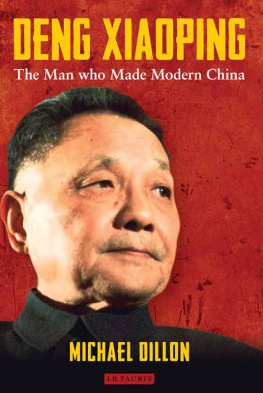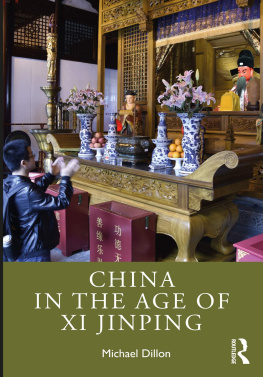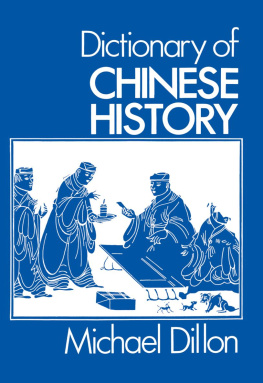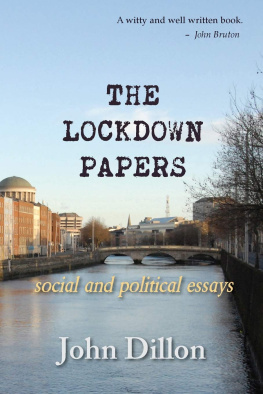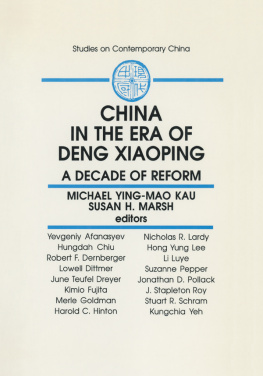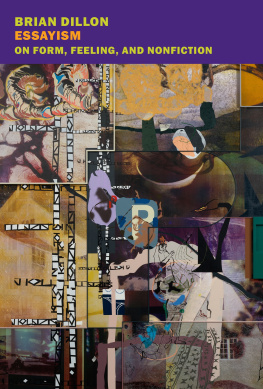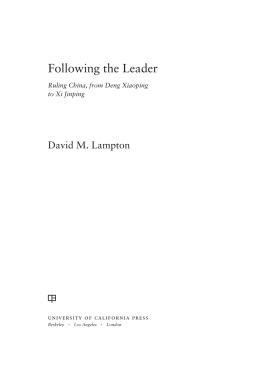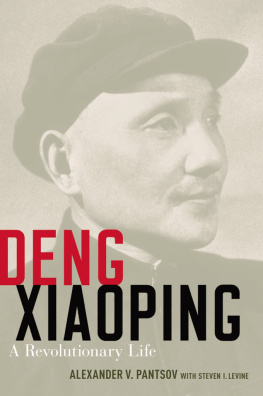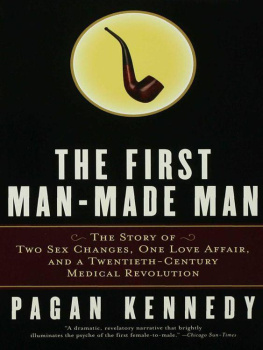Michael Dillon - Deng Xiaoping: The Man who Made Modern China by Michael Dillon
Here you can read online Michael Dillon - Deng Xiaoping: The Man who Made Modern China by Michael Dillon full text of the book (entire story) in english for free. Download pdf and epub, get meaning, cover and reviews about this ebook. year: 2014, publisher: I.B.Tauris, genre: Non-fiction / History. Description of the work, (preface) as well as reviews are available. Best literature library LitArk.com created for fans of good reading and offers a wide selection of genres:
Romance novel
Science fiction
Adventure
Detective
Science
History
Home and family
Prose
Art
Politics
Computer
Non-fiction
Religion
Business
Children
Humor
Choose a favorite category and find really read worthwhile books. Enjoy immersion in the world of imagination, feel the emotions of the characters or learn something new for yourself, make an fascinating discovery.
- Book:Deng Xiaoping: The Man who Made Modern China by Michael Dillon
- Author:
- Publisher:I.B.Tauris
- Genre:
- Year:2014
- Rating:4 / 5
- Favourites:Add to favourites
- Your mark:
- 80
- 1
- 2
- 3
- 4
- 5
Deng Xiaoping: The Man who Made Modern China by Michael Dillon: summary, description and annotation
We offer to read an annotation, description, summary or preface (depends on what the author of the book "Deng Xiaoping: The Man who Made Modern China by Michael Dillon" wrote himself). If you haven't found the necessary information about the book — write in the comments, we will try to find it.
Deng Xiaoping: The Man who Made Modern China by Michael Dillon — read online for free the complete book (whole text) full work
Below is the text of the book, divided by pages. System saving the place of the last page read, allows you to conveniently read the book "Deng Xiaoping: The Man who Made Modern China by Michael Dillon" online for free, without having to search again every time where you left off. Put a bookmark, and you can go to the page where you finished reading at any time.
Font size:
Interval:
Bookmark:
MICHAEL DILLON was founding Director of the Centre for Contemporary Chinese Studies at the University of Durham, where he taught Modern Chinese History. He is a Fellow of the Royal Historical Society and the Royal Asiatic Society and was Visiting Professor at Tsinghua University in Beijing in 2009. He is the author of China: A Modern History (I.B.Tauris).
Published in 2015 by I.B.Tauris & Co. Ltd
6 Salem Road, London W2 4BU
175 Fifth Avenue, New York NY 10010
www.ibtauris.com
Distributed in the United States and Canada Exclusively by Palgrave Macmillan
175 Fifth Avenue, New York NY 10010
Copyright 2015 Michael Dillon
The right of Michael Dillon to be identified as the author of this work has been asserted by the author in accordance with the Copyright, Designs and Patents Act 1988.
All rights reserved. Except for brief quotations in a review, this book, or any part thereof, may not be reproduced, stored in or introduced into a retrieval system, or transmitted, in any form or by any means, electronic, mechanical, photocopying, recording or otherwise, without the prior written permission of the publisher.
Every attempt has been made to gain permission for the use of the images in this book. Any omissions will be rectified in future editions.
ISBN: 978 1 78076 895 3
eISBN: 978 0 85773 539 3
A full CIP record for this book is available from the British Library
A full CIP record is available from the Library of Congress
Library of Congress Catalog Card Number: available
Contents
A well-paced, and judicious account, well written and very easy to read. Its strength is in giving equal weight to the various phases of Dengs career, rather than focussing too much on the post-1978 period. It also captures something of the complexity and contradictoriness of Deng.
Kerry Brown, author of The New Emperors
Through this fascinating and clearly written biography of Deng Xiaoping, Michael Dillon shows us how different Chinese power politics works from our economic and political world. Economic liberalisation that seems capitalist to the extreme, is combined with state interference and ideological conservatism. In this respect Xi Jinping can be seen as a straight continuation of Deng Xiaopings reform agenda.
Barend Ter Haar, Run Run Shaw Professor of Chinese, University of Oxford
List of Plates
Dengs birthplace in Paifang
The Deng museum in Paifang
Deng in France, 1921
Deng (top row, second from right) at the Chinese Socialist Youth Group conference, Paris, July 1924. Zhou Enlai is in the front row, fourth from left
Deng delivers a report in Yanan, September 1937
Deng and his wife, Zhuo Lin, in the Taihang Mountains
Deng and Liu Bocheng of the 129th Division
Deng, Chen Yi and their families, Shanghai, 1949
Deng and Liu Bocheng, Chongqing, late 1949
The CCP Congress report on the Gao Gang and Rao Shushi case, March 1955
Deng and He Long engaging in manual labour at Ming Tombs, 1958
Deng at Daqing oilfield, 16 July 1964
Deng and Zhou Enlai at Beijing airport, April 1974
Deng at a memorial ceremony for Zhou Enlai, January 1976
Chinese Communist Party 10th Central Committee plenum, 27 July 1977
Deng and Peng Zhen, 1981
Deng on an inspection tour, spring 1983
Deng the calligrapher, spring 1984
Deng at Wuhan railway station on the Southern Tour, 1992
Deng in Shanghai on the Southern Tour
Deng playing bridge, 1990s
Acknowledgements
In Montargis I am grateful to Mme. Dr. Peiwen Wang, President of the Association Amiti Chine Montargis; M. Stphane Poisson, Chef de Cabinet du Maire; and the staff of the secretariat and office of the Mairie for assistance with material on the presence in the town of Deng Xiaoping and other Chinese students on the workstudy programme. Joyce Dillon shared the search for traces of Deng in France and prepared the index. Jan van der Made, of Radio France International, very kindly made available to me his reports from Beijing for Dutch radio on the death of Deng.
In addition to having one of the best collections of recently published academic books in Beijing, All Sages Books (Wansheng shuyuan) on Chengfu Road in Wudaokou was the perfect place to read and reflect on modern Chinese history and the life of Deng Xiaoping and his contemporaries over lunch or coffee. The advice and assistance of staff at Xinhua Books in Wangfujing was also invaluable. In Sichuan, material relating to Deng and local history came from the Deng residence (Xiaoping guju) museum in Paifang and Xinhua Books in Shapingba, Chongqing. As always the British Library and the Brotherton Library at the University of Leeds were valuable sources of older material.
At I.B.Tauris I am once again grateful for the assistance of the editorial, production and marketing staff and the anonymous readers. Lester Crooks encouragement and constructive criticism since the inception of the project, and Joanna Godfreys support and advice are much appreciated.
Preface
Dengs China has never achieved the currency that Maos China enjoyed in the 1960s and 1970s, but there is little doubt that the resurgence of the Chinese economy that began in the 1980s could not have taken place without the commanding presence of Deng Xiaoping. Mao was never the sole dictator of Maos China, as is sometimes suggested (although he may well have wished that he could be), and neither were the reforms that followed his death in 1976 solely the work of Deng. Deng had been one of Maos greatest supporters for many years, both before and after the Chinese Communist Party (CCP) came to power in 1949, but it is for his differences with Mao that he will be remembered rather than for the common ground that they shared. Deng was far from being the onlie begetter of Chinas post-Mao reforms: other senior communists, notably Zhou Enlai, Chen Yun and Zhu Rongji, played important supporting roles, but Deng secured the political support of the Communist Party and, without this, the economic reforms could not have begun. An understanding of Dengs life and work is essential if we are to comprehend the reasons behind both the success of the economic reform programme that he promoted so vigorously, and the impact on China of the limitations of his political vision, especially his obstinate resistance to any meaningful political reform.
The age of revolution and civil war, in which Deng Xiaopings personality and political views were formed, may have ended, but the age in which he came to exert a powerful influence on China, the age that began in 1976 with the end of the Cultural Revolution and the death of Mao Zedong, is still a work in progress. Deng Xiaopings long and eventful life began in 1904 in the rural depths of Sichuan, a populous but isolated province in south-western China, in the dying years of the Qing dynasty. It took him finally to Beijing and the leadership, in fact if not in name, of the Communist Party and the Chinese state at a time when he was able to bring about historic changes to the economy and society of his country, changes that are still determining its direction well into the twenty-first century. Dengs status in the party and the government was never precisely articulated, and foreign observers began to refer to Deng as the paramount leader of China. This was not a title used by the government or the Chinese Communist Party, but a form of words which recognised the fact that he appeared to rule China although he had not replaced Mao Zedong as chairman. Even if he was acknowledged to be the most senior political figure, Deng never had absolute control of policy, as is demonstrated by his tour of the south in 1992, at the age of 88, to defend his economic reforms.
He formally retired from active politics in the autumn of 1989 and spent much of his time playing bridge, one of his lifelong passions. He insisted that his only remaining position of authority was as honorary chairman of the Chinese Bridge Association one of the few instances where he used the title of chairman. In reality, as an honoured elder statesman, he continued to be consulted and exercised a degree of influence from behind the scenes although to what extent is debatable until his death in Beijing in 1997.
Next pageFont size:
Interval:
Bookmark:
Similar books «Deng Xiaoping: The Man who Made Modern China by Michael Dillon»
Look at similar books to Deng Xiaoping: The Man who Made Modern China by Michael Dillon. We have selected literature similar in name and meaning in the hope of providing readers with more options to find new, interesting, not yet read works.
Discussion, reviews of the book Deng Xiaoping: The Man who Made Modern China by Michael Dillon and just readers' own opinions. Leave your comments, write what you think about the work, its meaning or the main characters. Specify what exactly you liked and what you didn't like, and why you think so.

